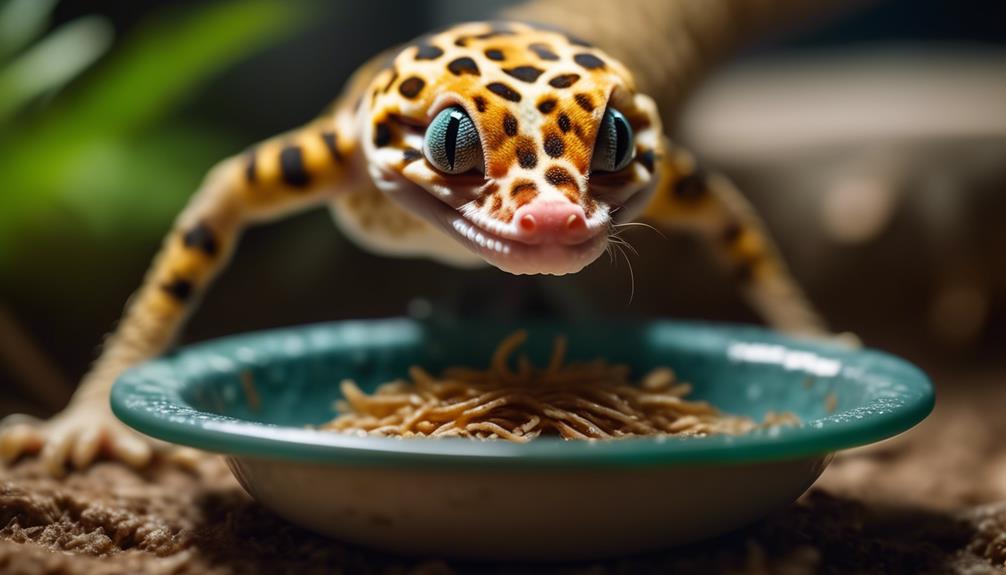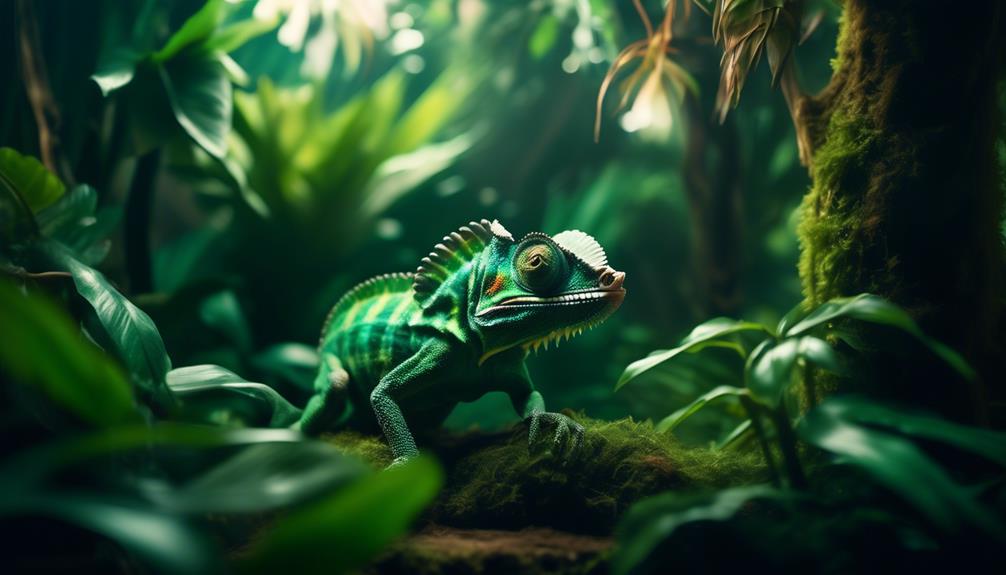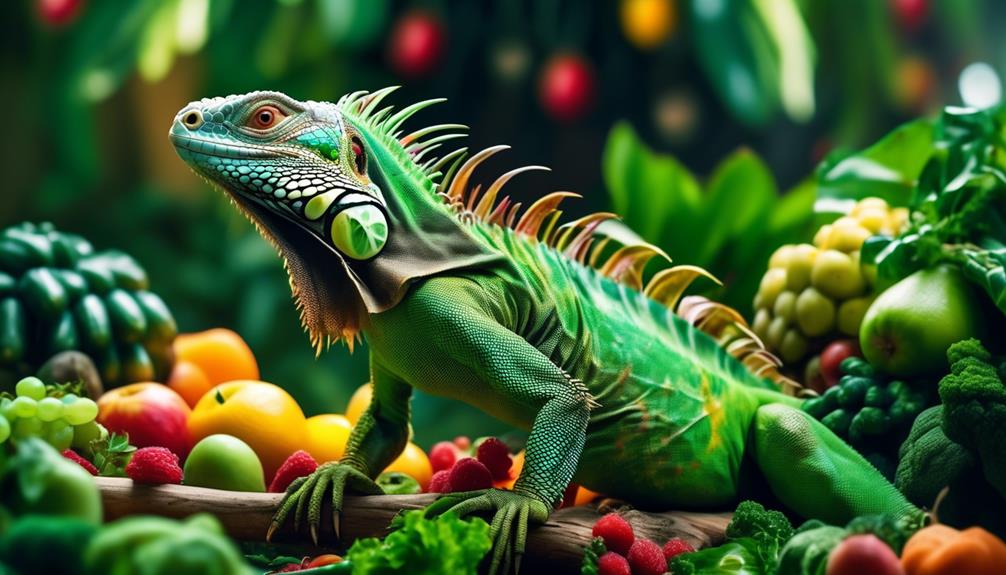Leopard geckos, those curious and captivating creatures, can occasionally find themselves in a situation where they refuse to feast. As devoted keepers of these marvelous reptiles, we may find ourselves concerned about their well-being and pondering the length of time it will take for them to indulge in their meals once again.
In this discussion, we shall explore the intriguing journey of leopard geckos starved for sustenance, uncovering the reasons behind their hunger strike, shedding light on their typical behaviors, emphasizing the significance of proper care, revealing when professional assistance is warranted, and offering strategies to entice these geckos back to their gastronomic glory.
So, how long until they satiate their appetite? Well, dear reader, let us delve into this captivating topic and discover the answers that await.
Key Takeaways
- Leopard geckos may not eat due to stress, inadequate husbandry, illness, aging, or breeding season.
- Normal behavior for leopard geckos includes temporary food strikes after moving, shedding skin, drinking water, and maintaining weight.
- Proper husbandry is crucial for leopard geckos, including appropriate setup, temperature, humidity, substrates, hiding spots, and a balanced diet.
- Veterinary assistance should be sought if lack of appetite persists, there are signs of illness or weight loss, sudden behavior changes, or concerns about the gecko's age.
Reasons for Leopard Geckos Not Eating
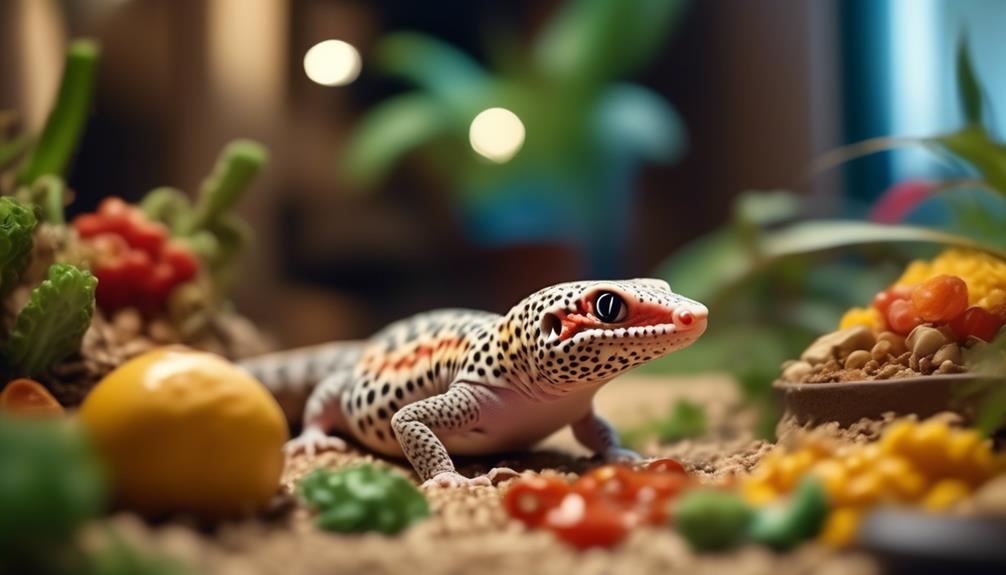
Leopard geckos may experience a variety of reasons for not eating, including stress from environmental changes, inadequate husbandry conditions, illness or health issues, the aging process, and a lack of appetite during breeding season.
Stress factors, such as sudden changes in temperature, lighting, or habitat, can greatly impact a leopard gecko's eating behavior. These changes disrupt their comfort and sense of security, leading to a decreased appetite.
Environmental changes, such as moving to a new home or rearranging their enclosure, can also contribute to stress and subsequent loss of appetite.
It's important to provide a stable and stress-free environment for leopard geckos to promote healthy eating habits.
Normal Behavior for Leopard Geckos
In their natural habitat, leopard geckos exhibit several normal behaviors that are important to understand for proper care and monitoring of their overall well-being. These behaviors include:
- Shedding skin and ingesting it's a normal behavior: Leopard geckos regularly shed their skin as they grow. They'll often eat the shed skin, which is rich in nutrients, to replenish their energy levels.
- Effects of stress on leopard geckos' appetite: Stress can have a significant impact on a leopard gecko's appetite. When they're stressed, they may go off their food temporarily or refuse to eat altogether. It's important to identify and address the source of stress to help them regain their appetite.
- Drinking water even when not eating: Leopard geckos will continue to drink water even when they aren't eating. This is a normal behavior and helps to keep them hydrated, especially during periods of fasting or when shedding their skin.
Understanding these normal behaviors can help leopard gecko owners provide appropriate care and address any concerns related to appetite or shedding. Monitoring their behavior and providing a stress-free environment are key for their well-being.
Importance of Proper Husbandry
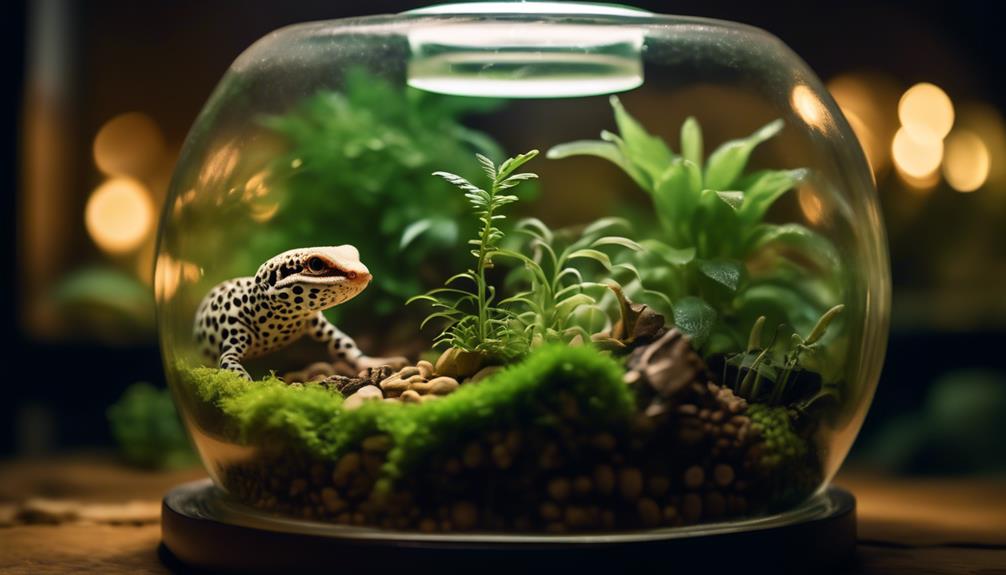
Understanding the normal behaviors of leopard geckos is crucial for providing appropriate care and monitoring their overall well-being; however, it's equally important to recognize the significance of proper husbandry in ensuring the health and thriving of these fascinating reptiles.
Checking husbandry conditions and providing a suitable environment are key aspects of responsible leopard gecko ownership. To ensure their well-being, it's essential to adhere to the guidelines outlined in leopard gecko care sheets and maintain correct temperature, humidity, and lighting conditions.
Providing suitable substrates and hiding spots, along with offering a varied and balanced diet, are also essential for their overall health. Regular veterinary check-ups are recommended to assess their overall well-being and address any potential health issues.
When to Seek Veterinary Assistance
If you notice any concerning signs or behaviors in your leopard gecko, it's important to seek veterinary assistance promptly. Leopard geckos can be susceptible to various illnesses and health issues, and addressing them early is crucial for their well-being.
Here are three signs that indicate it's time to consult a veterinarian:
- Persistent Lack of Appetite: If your leopard gecko's appetite doesn't improve even after adjusting husbandry conditions, it could be a sign of an underlying health problem.
- Signs of Illness: Look out for symptoms such as lethargy, weight loss, abnormal feces, respiratory issues, or any other unusual behavior or physical changes.
- Impact of Stress on Appetite: Stress can have a significant impact on a leopard gecko's appetite. If your gecko is showing signs of stress, such as hiding excessively or exhibiting aggressive behavior, it's important to seek veterinary assistance to address the underlying cause.
Recommendations for Helping Leopard Geckos Start Eating Again
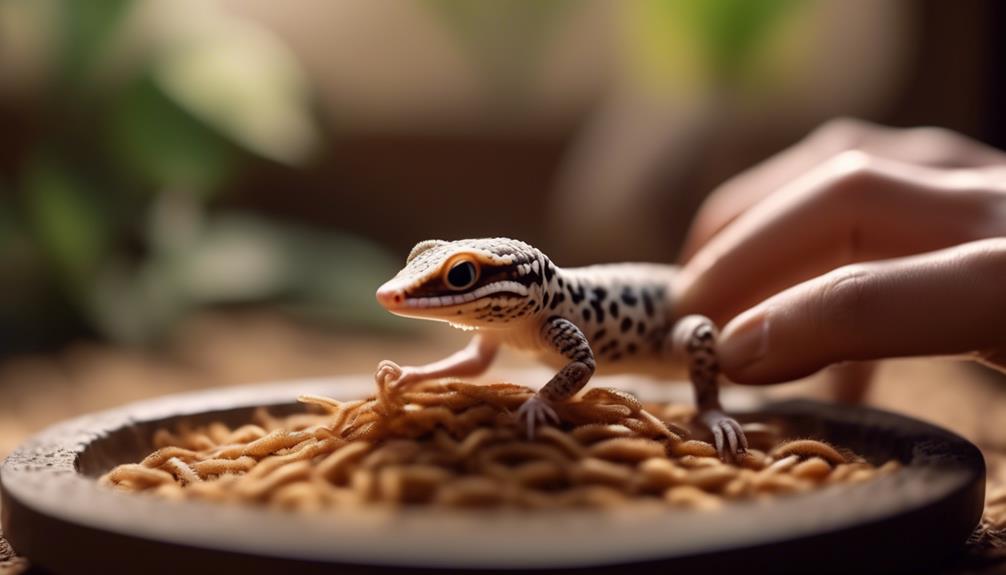
After addressing any concerning signs or behaviors in your leopard gecko, it's important to implement specific recommendations that can help stimulate their appetite and encourage them to start eating again.
One important step is to double-check the temperatures in their enclosure using a digital probe thermometer or temp gun. Leopard geckos require specific temperature ranges for optimal digestion and metabolism.
Additionally, it's crucial to avoid handling the gecko until it starts eating again. Handling can cause stress and disrupt their feeding behavior.
Providing a variety of insect prey can also help stimulate their appetite, as different insects offer different tastes and textures.
Creating a stress-free environment with minimal disturbances is vital, as stress can negatively impact their appetite.
If the gecko's lack of appetite persists, it's advisable to consult with an experienced reptile veterinarian for further guidance.
Frequently Asked Questions
How Long Can a Leopard Gecko Go Without Eating Before It Becomes a Concern?
Leopard geckos can go without eating for a period of time before it becomes a concern. However, signs of malnutrition such as weight loss or a prolonged lack of appetite should prompt immediate veterinary attention.
Can Stress From Handling or Loud Noises Cause a Leopard Gecko to Stop Eating?
Handling stress and noise sensitivity can indeed cause a leopard gecko to stop eating. These factors can lead to significant stress, affecting their appetite. It is important to provide a calm and quiet environment to help them regain their appetite.
Are There Any Specific Breeds or Morphs of Leopard Geckos That Are More Prone to Not Eating?
There are no specific breeds or morphs of leopard geckos that are more prone to not eating. However, it's important to provide them with appropriate diets and consider their breeding patterns when addressing any feeding issues.
Can a Leopard Gecko's Diet Affect Its Appetite?
Leopard gecko diet has a direct impact on their appetite. Proper nutrition is crucial for maintaining a healthy appetite. Feeding habits influence their overall health and well-being, so it's important to provide a balanced and varied diet.
Can a Leopard Gecko's Lack of Appetite Be a Sign of a More Serious Underlying Health Issue?
A leopard gecko's lack of appetite can be a sign of a more serious underlying health issue. Signs of illness include persistent lack of appetite, weight loss, changes in behavior, and sudden decrease in activity level. To encourage a leopard gecko to eat, ensure proper husbandry, offer a variety of insect prey, and consult with a reptile veterinarian for guidance.
Conclusion
In conclusion, understanding the reasons behind leopard geckos not eating is crucial for their health and well-being. By addressing factors such as stress, inadequate husbandry, illness, and breeding season, we can take appropriate action to help our geckos start eating again.
Providing proper husbandry, seeking veterinary assistance when necessary, and implementing recommended strategies can greatly contribute to their appetite recovery.
Remember, just like us, leopard geckos need a nurturing environment to thrive and enjoy their meals.
